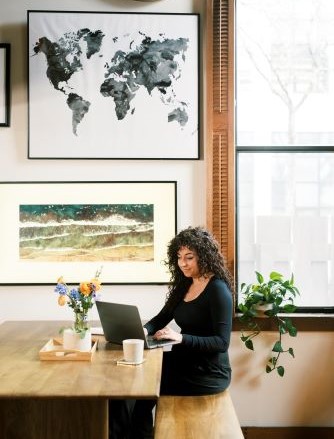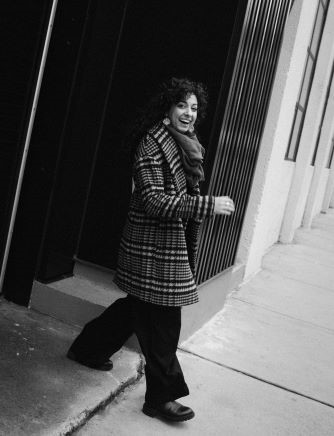
How Kimberly Dowd Uses UX to Elevate the Google Experience
When she was first searching for a college, Kimberly Dowd ’13, MSHFID ’16 thought of Bentley as a place for accounting and finance — industries she says she ‘never quite fit into.’ But after she gave it a chance and ultimately decided to enroll, the university ended up becoming the place where she completed not one but two degrees: an undergraduate in Experience Design (formerly known as Information Design and Corporate Communication), and a master’s degree in Master’s in Human Factors in Information Design (MSHFID). And today, she works for one of the world’s most widely recognized brands: Google.
“Bentley just felt like a good place to be,” Dowd recalls of visiting campus during high school. “You could see it was a bit more ‘real-world’ than other schools; people were doing case studies and meeting with companies.” 
Now that she is surrounded by user experience (UX) professionals at Google, where she is a UX research lead focused on Kids & Families, she realizes just how much that education has paid off. But it’s not just about technical skills. “Bentley education helps prepare you for the way that a company functions: understanding what the needs are and assessing what the stakeholders are looking for,” Dowd says.
A mentor, IDCC Adjunct Lecturer Meena Kothandaraman, was one of the first in the Bentley community to teach her just that. “Professor Kothandaraman taught me a lot about how to choose different field methods and what makes sense,” Dowd says of what she learned in an HFID Field Methods course. “She really helped me understand how to approach any problem by understanding all users and then developing a framework for getting to an answer. UX research is about understanding people and designing for everyone.”
One of Google’s founding company philosophies — focus on the user and all else will follow — guides Dowd’s work. “Researching and building a great Search experience means looking at questions that the whole family — from young people to parents to caregivers — might ask a search engine.”
“At Google, I start with the baseline of the whole family's" needs and what will work for them — whether it’s their reading level or needing video components. We need to make sure that caregivers are behind the wheel, particularly related to safety. I have to ask what a safe and effective search experience looks like for the whole family — and priorities can shift among cultures. It’s an interesting design challenge.”
PROTOTYPING A CAREER
UX research, according to IDCC Professor and MSHFID Program Director Bill Gribbons, involves gaining a deeper understanding of a user’s goals, abilities, limitations and needs. “We employ a variety of qualitative and quantitative techniques to gain insights in each of those areas. Quality research is prerequisite to delivering value to the user and designing market-leading products and services.”
Dowd says it was Gribbons who initially led her down the UX path. “I didn’t know what I wanted to do with my life; I liked art, I liked people and I liked technology. Professor Gribbons helped me make the connection of understanding that Bentley’s MSHFID program translates into a combination of art, technology and people. That was such a light bulb moment for me, and it was really valuable.”
Bentley’s MSHFID program includes courses in both UX research and design, as well as customer experience. Students have a chance to practice UX research methods — including ethnography, field research, interviews, survey design and formative and summative usability testing — in the on-campus User Experience Center (UXC).
Dowd juggled the full-time MSHFID with part-time work in the field. Gribbons connected her with an opportunity as a UX researcher at Fidelity Investments, while Kothandaraman connected her to Mad*Pow, where as an Experience Research Director, Dowd led research projects on business development and client experience for companies like BMW, Netflix, USAA, Mass General Hospital, State Street Global Advisors and Cigna.
It was an experience studying abroad in Seville, Spain, as an undergraduate student that would later navigate her career path to Google offices in London several years after earning her MSHFID degree. “If I had to summarize my experience moving abroad, it would be ‘exponential growth’ — and Bentley is the reason I did that,” Dowd says.
Dowd moved to the U.K., working in the Google London office for five years. She worked on publisher experience on Sellside Ads for three years before she took on a role as lead researcher for Health Connect By Android and developed a passion for designing for health and equity.
“When it comes to health equity, oftentimes it’s the system that disadvantages people,” Dowd says. “It’s critical to consider how to understand the mindset of different communities to design in a way that will work for them. Take the time to understand as many people as you can, preferably by bringing them in directly. But if that’s not an option, it’s my job as a researcher to empower people who are not in the room and give them a voice.”
The overarching goal of her role, Dowd adds, was “to help billions of people be healthier. I led research with Google’s top health and fitness partners to ensure the ecosystem strategy was defined by user needs from lifestyle and health to condition management and healthcare systems and everything in between.”
 In her current role as UX research lead at Google, Dowd is back in the U.S., but the global nature of her work hasn’t changed. As she conducts focus groups and field research in different countries to identify cultural nuances, she says, “My IDCC degree helps me with the interpersonal and storytelling aspects of my job — helping partners understand UX and users’ needs, behaviors and motivations — while the MSHFID degree helps with the actual extracting of information. Being a researcher changes all the time depending on the problem you’re trying to solve and the user voices you’re trying to elevate. That’s important to me.”
In her current role as UX research lead at Google, Dowd is back in the U.S., but the global nature of her work hasn’t changed. As she conducts focus groups and field research in different countries to identify cultural nuances, she says, “My IDCC degree helps me with the interpersonal and storytelling aspects of my job — helping partners understand UX and users’ needs, behaviors and motivations — while the MSHFID degree helps with the actual extracting of information. Being a researcher changes all the time depending on the problem you’re trying to solve and the user voices you’re trying to elevate. That’s important to me.”
Her advice to MSHFID students and aspiring UX leaders? “Work doesn’t have to be boring — and it never should be. Learn to measure and share impact, focus on storytelling and consider working abroad. And don’t underestimate the Bentley network and the value of your work.”

